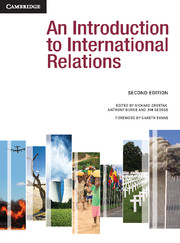Book contents
- Frontmatter
- Contents
- Tables, Figures and Boxes
- Contributors
- Preface and acknowledgements
- An Introduction to International Relations: The origins and changing agendas of a discipline
- 1 Theories of International Relations
- 2 The Traditional Agenda
- 3 The New Agenda
- 21 The United Nations
- 22 Non-State Actors: Multinational Corporations and International Non-Governmental Organisations
- 23 Religion and Secularism
- 24 Global Economic Institutions
- 25 Global Trade
- 26 Global Finance
- 27 Global Poverty, Inequality and Development
- 28 Globalisation and Its Critics
- 29 Global Terrorism
- 30 Post-Conflict State-Building
- 31 Humanitarian Intervention
- 32 Human Rights
- 33 Migration and Refugees
- 34 Global Environmental Politics
- 35 Climate Change
- Glossary of Terms
- Bibliography
- Index
- References
28 - Globalisation and Its Critics
from 3 - The New Agenda
- Frontmatter
- Contents
- Tables, Figures and Boxes
- Contributors
- Preface and acknowledgements
- An Introduction to International Relations: The origins and changing agendas of a discipline
- 1 Theories of International Relations
- 2 The Traditional Agenda
- 3 The New Agenda
- 21 The United Nations
- 22 Non-State Actors: Multinational Corporations and International Non-Governmental Organisations
- 23 Religion and Secularism
- 24 Global Economic Institutions
- 25 Global Trade
- 26 Global Finance
- 27 Global Poverty, Inequality and Development
- 28 Globalisation and Its Critics
- 29 Global Terrorism
- 30 Post-Conflict State-Building
- 31 Humanitarian Intervention
- 32 Human Rights
- 33 Migration and Refugees
- 34 Global Environmental Politics
- 35 Climate Change
- Glossary of Terms
- Bibliography
- Index
- References
Summary
Introduction
The purpose of this chapter is to introduce the contemporary theoretical debates surrounding globalisation. It illustrates the main features of protests against the social consequences of a globalised economy, and it identifies some of the key political issues that scholars and students of International Relations (IR) must face when addressing the promotion of justice and effective governance within a more densely connected world.
Since the mid-1990s the term globalisation has entered common usage and become a central issue in public debates in most countries around the world because of the apparently changed structure of world politics and economics. Globalisation has become associated with the controversial social outcomes that have stemmed from an increasingly integrated global economy, and the resulting public disquiet and controversy around the world, as particularly symbolised by the 1999 protests in Seattle against the World Trade Organization (WTO) and more recent protests in the aftermath of the Global Financial Crisis of 2008–9. Globalisation has also become an important – although essentially contested – concept within the field of IR and other social science disciplines. It is therefore essential to understand what globalisation means.
- Type
- Chapter
- Information
- An Introduction to International Relations , pp. 386 - 397Publisher: Cambridge University PressPrint publication year: 2011

